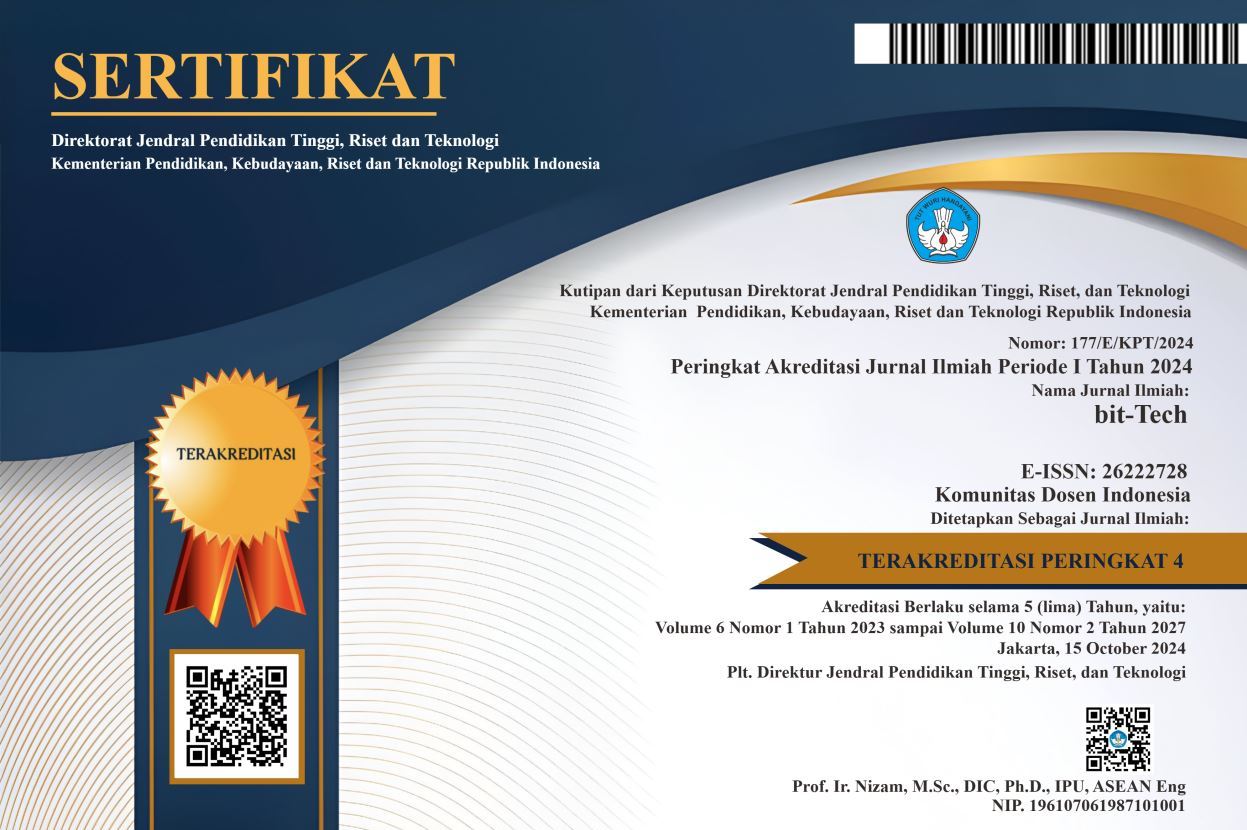Optimizing Virtual Culinary Tours Using Character-based Interaction and Finite State Machine (FSM)
DOI:
https://doi.org/10.32877/bt.v7i2.1886
Keywords:
Character-based, Culinary , Finite State Machine, NPC, Virual Tour 3D
Abstract
This research focuses on the development of a Virtual Tour application utilizing Finite State Machine (FSM) to enhance the interaction of a Non-Playable Character (NPC) as a tour guide in a 3D virtual environment. The primary issue addressed is the significant impact of the COVID-19 pandemic on the tourism industry, which led to travel restrictions and limited opportunities for visitors to explore tourist destinations physically. The aim of the study is to create a virtual tourism experience as an alternative solution, enabling users to explore historical sites like Pasar Lama Tangerang remotely through Google Cardboard VR. To achieve this, the NPC’s behavior is controlled using FSM, allowing the character to transition between states—idle, walking, and talking—based on user interactions. Data was collected through user testing with a Likert scale questionnaire, evaluating user satisfaction and the effectiveness of the FSM method. The results revealed a 74.35% positive user rating, categorized as Good, demonstrating the potential of FSM to provide an interactive, engaging, and educational virtual tour experience. These findings highlight the effectiveness of FSM in creating a dynamic and user-responsive virtual tour, offering significant benefits to the tourism sector by providing an innovative, accessible, and immersive way for potential visitors to explore destinations during travel restrictions. This research contributes to the growing field of e-tourism, showcasing the potential of virtual reality and FSM to transform the tourism industry in times of crisis.
Downloads
References
M. Aminullah, “Konsep Pengembangan Diri Dalam Menghadapi Perkembangan Teknologi Komunikasi Era 4.0,” Komunike, vol. 12, no. 1. pp. 1–23, 2020. doi: 10.20414/jurkom.v12i1.2243.
L. Yuniartha and W. T. Rahmawati, “Pengusaha Hotel dan Restoran Mengaku Rugi Rp 70 Triliun Akibat Corona,” Jul. 14, 2020. [Online]. Available: https://money.kompas.com/read/2020/07/14/193000926/pengusaha-hotel-dan-restoran-mengaku-rugi-rp-70-triliun-akibat-corona
A. R. Triani, A. R. Adriyanto, and D. Faedhurrahman, “Media Promosi Bisnis Potensi Wisata Daerah Bandung,” J. Bhs. Rupa, vol. 1, no. 2, pp. 136–146, 2019, [Online]. Available: http://jurnal.stiki-indonesia.ac.id/index.php/jurnalbahasarupa
M. U. Kawulur et al., “Virtual Tour e-Tourism Objek Wisata Alam di Kabupaten Biak Numfor,” J. Tek. Inform., vol. 13, no. 3, pp. 1–6, 2018.
E. Novianti, M. Pariwisata, and B. Universitas, “VIRTUAL TOUR: TOURISM COMMUNICATION MEDIA DURING THE COVID-19 PANDEMIC IN INDONESIA Magister Pariwisata Berkelanjutan Universitas Padjajaran , Bandung Vol . 14 / No . 1 / APRIL 2021 - Profetik Jurnal Komunikasi Vol . 13 / No . 1 / APRIL 2020 - Profetik J,” vol. 14, no. 1, pp. 135–150, 2021.
S. M. Lavalle, Virtual Reality. New York, 2023. doi: 10.1017/9781108182874.
V. De Luca, G. Marcantonio, M. C. Barba, and L. T. De Paolis, “A Virtual Tour for the Promotion of Tourism of the City of Bari,” Inf., vol. 13, no. 7, pp. 1–16, 2022, doi: 10.3390/info13070339.
J. DuBose, “Discontinued Virtual Reality Systems: The Future Becoming The Past,” Public Serv. Q., vol. 18, no. 4, pp. 310–315, 2022.
M. M. Asad, A. Naz, P. Churi, and M. M. Tahanzadeh, “Virtual Reality as Pedagogical Tool to Enhance Experiential Learning: A Systematic Literature Review,” Educ. Res. Int., vol. 2021, 2021, doi: 10.1155/2021/7061623.
A. T. NNW, “Penerapan Finite state Machine Pada Perancangan Game,” Gamelab Indonesia, 2020. https://www.gamelab.id/news/206-penerapan-finite-state-machine-pada-perancangan-game
Trivusi, “Finite State Automata: Pengertian, Cara Kerja, dan Jenis-jenisnya,” 2022. https://www.trivusi.web.id/2022/08/finite-state-automata.html
M. A. Mahendrata, E. Muhammad, A. Jonemaro, and M. A. Akbar, “Penerapan Decision Making NPC dengan Metode Hierarchical Finite State Machine Pada 2D Endless Runner Game,” Jurnal Pengembangan Teknologi Informasi dan Ilmu Komputer, vol. 3, no. 9. pp. 8423–8428, 2019. [Online]. Available: http://j-ptiik.ub.ac.id
G. Ramesh and A. Menen, “Automated dynamic approach for detecting ransomware using finite-state machine,” Decision Support Systems, vol. 138. 2020. doi: 10.1016/j.dss.2020.113400.
E. W. Hidayat, A. N. Rachman, and M. F. Azim, “Penerapan Finite State Machine pada Battle Game Berbasis Augmented Reality,” J. Edukasi dan Penelit. Inform., vol. 5, no. 1, p. 54, 2019, doi: 10.26418/jp.v5i1.29848.
H. F. Ramadhan, S. H. Sitorus, and S. Rahmayuda, “Game Edukasi Pengenalan Budaya dan wisata Kalimantan Barat Menggunakan Metode Fitnite State Machine Berbasis Android,” Coding J. Komput. dan Apl., vol. 07, no. 1, pp. 108–119, 2019.
T. Ahmed and M. J. Hossain, “VR Chiriyakhana: A Virtual Zoo Using Google Cardboard,” SN Comput. Sci., vol. 1, no. 6, pp. 1–7, 2020, doi: 10.1007/s42979-020-00363-0.
O. El-Said and H. Aziz, “Virtual Tours a Means to an End: An Analysis of Virtual Tours’ Role in Tourism Recovery Post COVID-19,” J. Travel Res., vol. 61, no. 3, pp. 528–548, 2022, doi: 10.1177/0047287521997567.
R. M. Riesa and A. Haries, “Virtual Tourism dalam Literature Review,” J. Pariwisata Bunda, vol. 01, no. 1, pp. 1–6, 2020.
A. Nopriansyah, I. Kanedi, U. Dehasen Bengkulu Jl Meranti No, S. Lebar, K. Ratu Agung, and K. Bengkulu, “Rancang Bangun Game 2D Shooter Menggunakan Metode Finite State Machine,” SITEKIN J. Sains, Teknol. dan Ind., vol. 19, no. 2, pp. 171–177, 2022.
E. A. Laksono and A. Susanto, “Mathematics Education Game Using the Finite State Machine Method to Implement Virtual Reality in Game Platformer,” Inf. J. Ilm. Bid. Teknol. Inf. dan Komun., vol. 5, no. 1, pp. 8–13, 2020, doi: 10.25139/inform.v5i1.1860.
Downloads
Published
How to Cite
Issue
Section
License
Copyright (c) 2024 bit-Tech

This work is licensed under a Creative Commons Attribution-ShareAlike 4.0 International License.
I hereby assign and transfer to bit-Tech all exclusive copyright ownership rights to the above work. This includes, but is not limited to, the right to publish, republish, downgrade, distribute, transmit, sell, or use the work and other related materials worldwide, in whole, or in part, in all languages, in electronic, printed, or any other form of media, now known or hereafter developed and reserves the right to permit or license a third party to do any of the above. I understand that this exclusive right will belong to bit-Tech from the date the article is accepted for publication. I also understand that bit-Tech, as the copyright owner, has sole authority to license and permit reproduction of the article. I understand that, except for copyright, any other proprietary rights associated with the work (e.g. patents or other rights to any process or procedure) must be retained by the author. In addition, I understand that bit-Tech permits authors to use their papers in any way permitted by the applied Creative Commons license.


 DOI :
DOI :
 Abstract views: 87
/
Abstract views: 87
/  PDF downloads: 47
PDF downloads: 47











